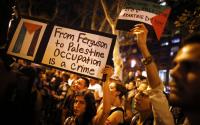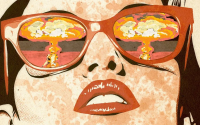June 10, 2004Znet/ New Statesman
The D-Day anniversary and the election campaign have been a rich time for the kind of propaganda that marks the limits of mainstream liberal debate in Britain. On 5 June, the Guardian gave a whole news page to its discredited warmonger, David Aaronovitch, whose support for the bloody invasion of Iraq in 2003 was in keeping with his defence of the bloody Soviet invasion of Hungary in 1956. Aaronovitch's assignment clearly was to demolish Respect, the small anti-war party contesting seats in the European parliament. The result was a show of contempt not so much for George Galloway and the activists who organised the greatest demonstration in British history, but for the moral intelligence of people who wish somehow to express their outrage at Blair's epic crime committed in their name. Martin Kettle, a Guardian commentator and leader writer, recently lamented the corruption in modem journalism; he cited the Daily Mirror's publication of apparently faked photographs of British soldiers torturing Iraqi prisoners - which they do. The question begs: what is corrupt: the Mirror's misjudgement, or the cynical deployment of Aaronovitch?
The Observer, once regarded as a liberal beacon, is now an exemplar of this propaganda. Having supported outright Blair's crime and abandoned a non-conformist tradition that opposed the invasion of Egypt in 1956, the Observer pursued its censorship-by-omission in a special D-Day issue. Woven crudely into the commemorative coverage was the promotion of Blair. Beneath "Day of Pride and Pathos" was "Blair hails America's wartime gamble". Allowed to prattle on about how bad dictators were and how fine American presidents were, Blair was not interrupted by proper journalistic reminder that he had previously said that his and Bush's unprovoked aggression was "so necessary" and "so misunderstood" because "a study of history provides so little instruction for the present day." With those words, Blair was warning us off a study of imperialism, of which Hitler's conquest of Europe is an enduring example.
However, to the judges at Nuremberg, there was no distinction; any unprovoked aggression "is not only an international crime, it is the supreme international crime [that] contains within itself the accumulated evil of the whole." Turn the pages of the Observer and there is a large picture of a resolute Blair superimposed on Allied troops landing in Normandy, and a "frank interview" with the prime minister by Tristram Hunt, "one of Britain's leading young historians". I hesitate to call Hunt's obsequiousness to Blair childish, because the omissions in his patter-cake questions and in Blair's inane replies would have been challenged in any secondary school classroom. It reminded me of a visit to Moscow University in the late 1970s, when I was entertained by another, similar "historian" straining every fibre not to mention the Kremlin's rapacious "mistakes". In addition to this, two pages of the Observer were devoted to "How the Gipper stole into American hearts".
This was a tribute to Ronald Reagan, whose "sunny attitude" and "iconic status" made him "a consummate communicator" whose "popularity knew no bounds". Yes, he had increased America's war spending as never before, but that was "to fight the Communist peril". Ad nausea. Reagan's true distinctions were as follows. At the height of his "popularity", fewer Americans voted for him than for any modern era president - 27 per cent of the electorate. No other post-1945 president, apart from George W Bush, presided over such a distortion in the economic life of the United States. Billions were taken from ordinary Americans and handed, in tax cuts, to the richest 5 per cent. The Reagan regime helped create the Taliban and supplied Saddam Hussein with chemical weapons. An anti-apartheid sanctions bill was passed in congress only after Reagan tried to veto it. Above all, it was Reagan's secret, illegal and murderous attacks on Central America, one of the world's poorest regions, for which he ought to be remembered. The Observer writer Paul Harris did make a passing reference to the Iran-Contra affair and the "public row" that "claimed some notable scalps". Reagan, however, "survived" - unlike tens of thousands of his victims. For most of his two terms in the 1980s, Reagan secretly approved an onslaught on El Salvador and Nicaragua. In El Salvador, the CIA funded, trained and directed a jack-booted, black-helmeted National Guard which, together with death squads it controlled, murdered thousands, especially moderate reformers: those like Jose Viera, president of the El Salvador Land Reform Institute, and Archbishop Oscar Romera, who was shot dead as he held up the chalice at Mass, having made the mistake of preaching that the enforced poverty of his flock was not God's will, and they should resist the American-sponsored terror regime. On rubbish tips outside San Salvador, morning after morning, I saw bodies killed by Reagan's clients, including pregnant women. In its attacks on Nicaragua, Reagan's "contra" forces specialised in slitting the throats of midwives and children as they slept. In charge of this terrorism was John Negroponte, US ambassador to Honduras, who, reported the Baltimore Sun, created and directed a military unit that "used shock and suffocation devices in interrogations. Prisoners often were kept naked and, when no longer useful, killed and buried in unmarked graves." George W Bush has just appointed Negroponte as the first American "ambassador" to "liberated" Iraq. You might have thought these matters were worthy of mention in the Observer - that, under Reagan, more than 100,000 people were slaughtered in Central America, and the United States was distinguished as the only country ever to have been convicted by the World Court for acts of terrorism. Having omitted all this, Harris quipped of the Gipper: "You had to admire his style". This is not the Telegraph, or a Murdoch paper. In Britain's oldest liberal newspaper, the very idea of a dissenting voice is becoming exotic.
Is this not a form of corruption? For it is dissent that is the bedrock of any worthwhile democracy, which those Britons who landed on the Normandy beaches fought and died for. They certainly did not fight and die for the cynicism and duplicity of the current British regime, whose leader has immersed himself in an America described by Norman Mailer as "pre-fascist". On 17 May, the New Statesman published a leading article saying that the work of its own dissenters had been vindicated and "accepted across the political spectrum". Such an honourable record was sullied in the last issue by a smear dressed up as journalism. The headline over this was "Saddam's very own party". Written by another "liberal" warmonger, the piece was backed by an editorial that dismissed the "odious values" of Respect, whose anti-war stand is apparently so threatening it requires airbrushing from the entire media coverage of the election campaign, as well as the double whammy of the Guardian and the New Statesman. I am not a campaigner for Respect, but thousands of principled people are. It is fair to say that none regards Saddam Hussein as anything but a monster; all unerringly opposed the invasion of Iraq, unlike many of those standing for elections. The New Statesman urges its readers to "swallow hard and vote Labour." Whether or not you vote for Respect or the Greens or whomever, what matters is that you do not vote Labour and legitimise the utterly corrupt policies of a ruling party responsible for so much bloodshed and suffering in a faraway country.
Otherwise, "not in my name" means nothing.






